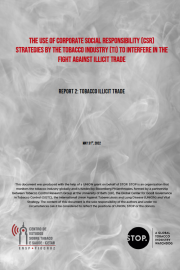
The illicit trade in tobacco products represents a major global concern for public health, economy and public safety. More specifically, the illicit trade in tobacco products undermines tobacco control policy efforts, particularly in relation to tax policy. As they are not taxed or regulated, illicit tobacco products do not have health warnings or packaging or labeling requirements, which favors their consumption. As with other regions in the world, the illegal cigarette trade in Mercosur involves lower average prices compared to taxed cigarettes. Furthermore, the increase in the accessibility of cigarettes, via the informal market, combined with the lower prices of smuggled products - and therefore not subject to regulation - favors the consumption of cigarettes by young people and low-income populations 1,4.
HASSELMANN, Luis Guilherme Hasselmann; RICHTER, Ana Paula Cardoso; TURCI, Silvana Rubano; SILVA, Vera Luiza da Costa. Uso pela indústria do tabaco (IT) de estratégias de Responsabilidade Social Corporativa (RSC) para interferir no combate ao comércio ilícito [projeto STOP]. Centro de Estudos sobre Tabaco e Saúde (Cetab), Rio de Janeiro, 23 mai. 2022. 49p.
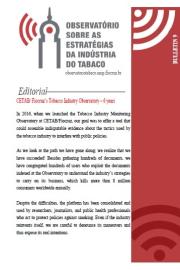
Bulletin nine published by the Center for Studies on Tobacco and Health of the Sergio Arouca National School of Public Health of the Oswaldo Cruz Foundation (Cetab/Ensp/Fiocruz). This edition consists of an editorial signed by Silvana Rubano Barretto Turci; Opinion: Who is interested in the transfer of Sister Lourdes Dill?; Electronic smoking devices (DEFs); Eduardo Leite: conflicting relations with the tobacco industry x Public Health and the radar column with the following headlines: book “Fight against tobacco in Brazil: 40 years of history” and Fiocruz Campaign promotes petition against the permission of cigarettes electronics in Brazil.
SIX years of CETAB/Fiocruz Tobacco Industry Monitoring Observatory [bulletin NINE]. Cetab/Ensp/Fiocruz, Rio de Janeiro, n. 9, 13 Apr. 2022.
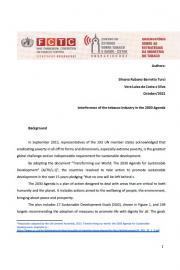
Agenda 2030 is an action plan designed to address critical areas for humanity and the planet. It includes activities aimed at the well-being of people, the environment, bringing peace and prosperity. The secretariat of the Framework for Tobacco Control (FCTC/WHO), understanding that the 17 SDGs are connected with the implementation of the convention, supports several measures of the 2030 Agenda through the execution of its articles. Among these measures are those established in the treaty's general obligations and in the treaty's central policies to reduce the supply and demand for tobacco, such as strengthening tobacco taxation (Article 6), protection against exposure to tobacco smoke (Article 8), the regulation of product packaging and labeling (Article 11) and the regulation of tobacco advertising, promotion and sponsorship (Article 13), among other articles.
INTERFERÊNCIA da indústria do tabaco na Agenda 2030. Cetab/Ensp/Fiocruz, Rio de Janeiro, out. 2021. 18p.
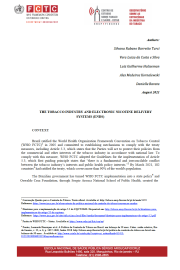
By ratifying the World Health Organization's Framework Convention on Tobacco Control (FCTC/WHO) in 2005, Brazil committed to establishing mechanisms to comply with the treaty's measures, including article 5.3 which states that “the Parties shall act to protect these policies from the commercial interests and other interests of the tobacco industry, in accordance with national legislation”. To support compliance with this measure, Guidelines were defined for the implementation of article 5.3, whose first guiding principle states that “there is a fundamental and irreconcilable conflict between the interests of the tobacco industry and the interests of public health”. By March 2021, 182 countries Parties had ratified the treaty, which covers more than 90% of the world's population.
TURCI, Silvana Rubano Barretto; SILVA, Vera Luiza da Costa e; HALSSEMAN, Luiz Guilherme; KORNALEWSKI, Alex Medeirosi; BARATA, Danielle. A indústria do tabaco e os dispositivos eletrônicos para fumar (DEFS). Cetab/Ensp/Fiocruz, Rio de Janeiro, 1 set. 2021.
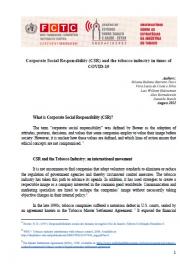
It is not uncommon to find companies that adopt voluntary rules to eliminate or reduce the regulation of government agencies and, therefore, circumvent control measures. The tobacco industry has taken this path, as a way of privileging its agenda. Furthermore, it has used strategies to create a respectable image, as a company interested in the common good, all over the world2. Communication and marketing specialists are hired to reshape the company's image, without necessarily making any objective changes to the company's internal policy.
TURCI, Silvana Rubano Barretto; SILVA, Vera Luiza da Costa e; HALSSEMAN, Luiz Guilherme; KORNALEWSKI, Alex Medeiros; BARATA, Danielle. Responsabilidade social corporativa (RSC) e a indústria de tabaco em tempos de Covid 19. Cetab/Ensp/Fiocruz, Rio de Janeiro, 1 set. 2021.
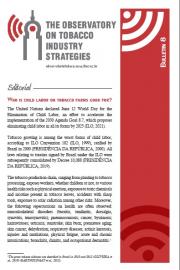
Bulletin eight published by the Center for Studies on Tobacco and Health of the Sergio Arouca National School of Public Health of the Oswaldo Cruz Foundation (Cetab/Ensp/Fiocruz). This edition comprises an editorial signed by Vera Luiza da Costa e Silva; opinion: the use of hookah in Brazil, by Andréa Reis Cardoso; interview with Eric Diego Barioni; and the radar section, with the latest reports.
WHO is child labor on tobacco farms good for?? [bulletin EIGHT]. Cetab/Ensp/Fiocruz, Rio de Janeiro, n. 8, 9 ago. 2021.